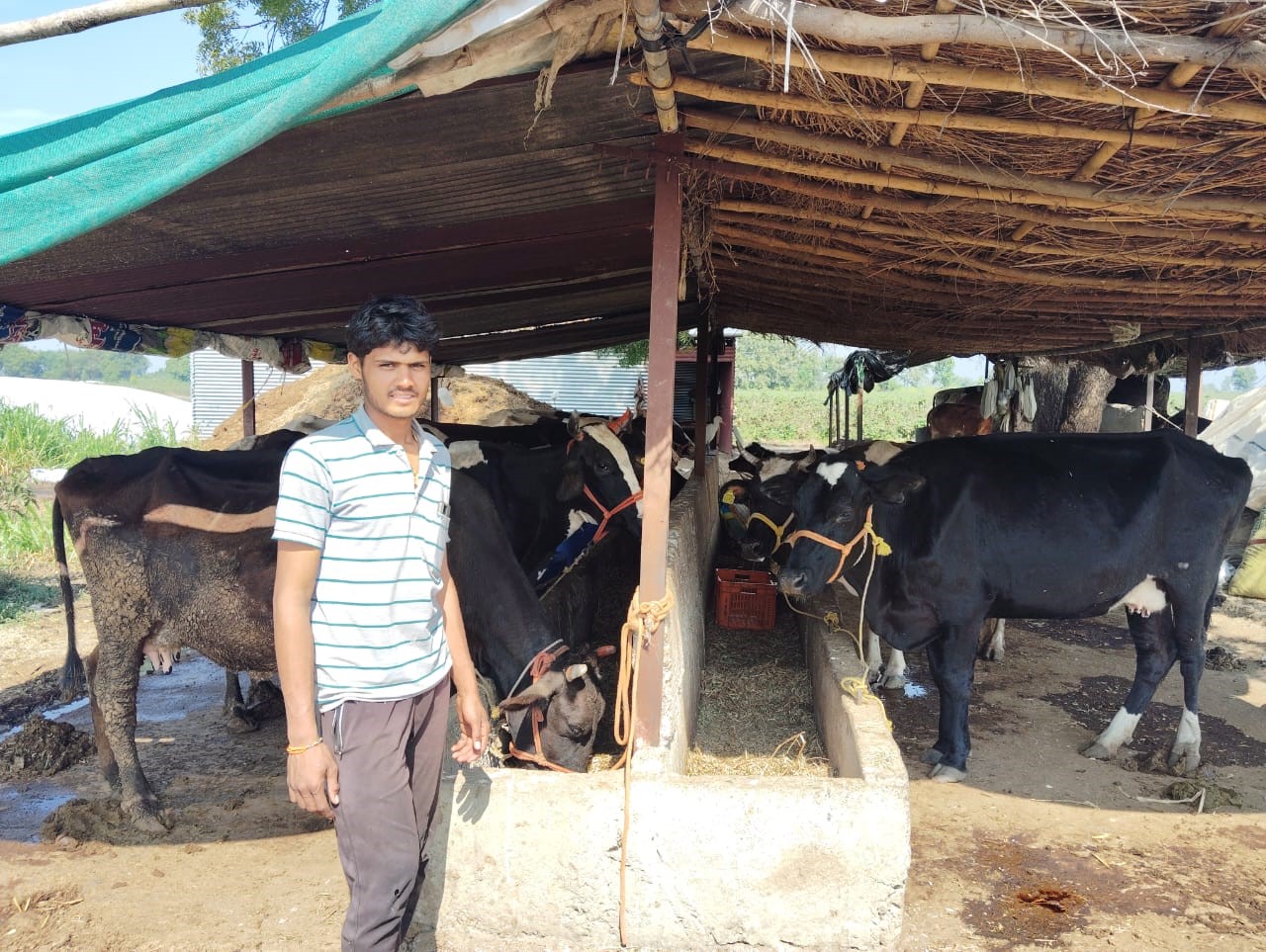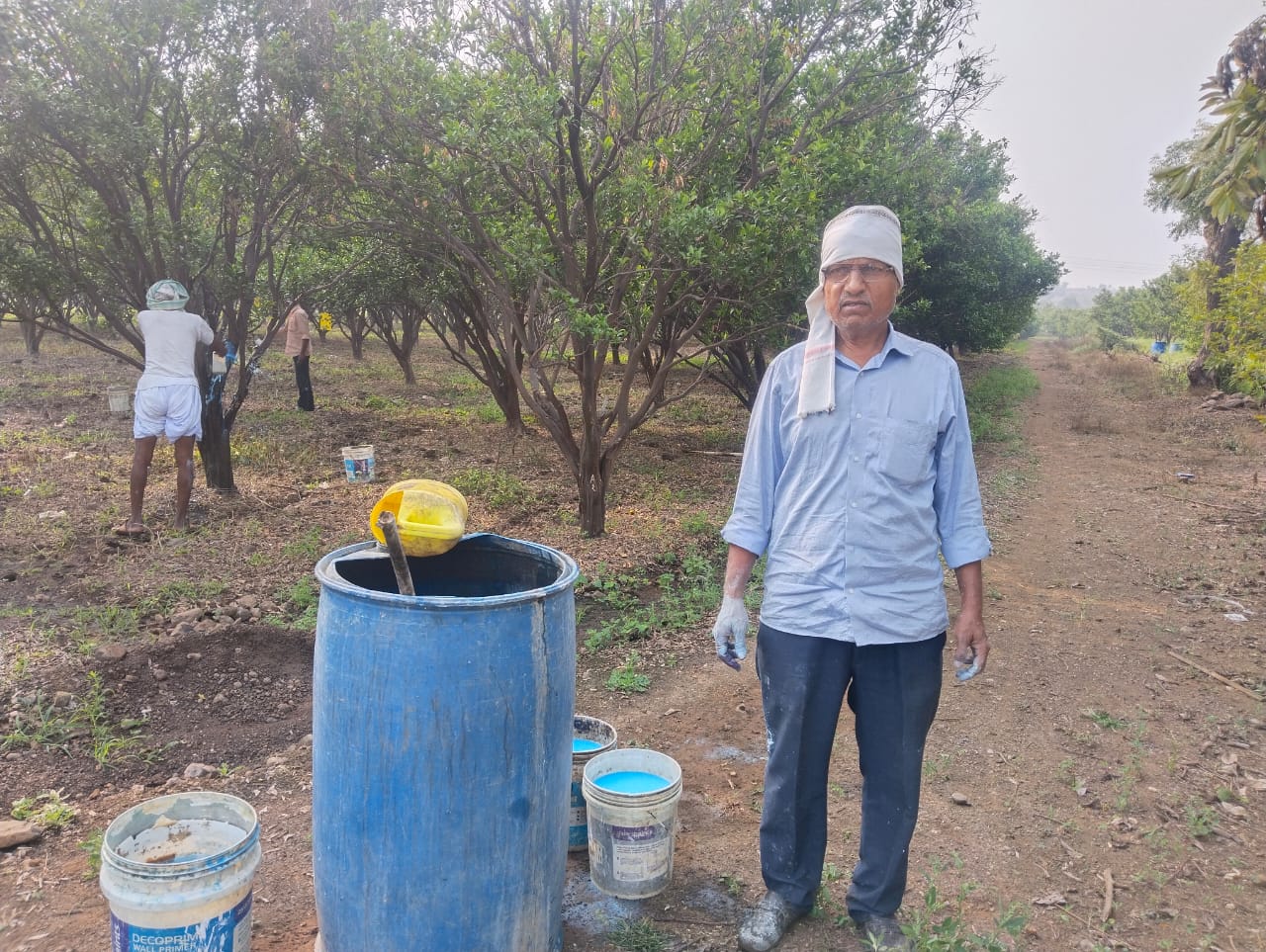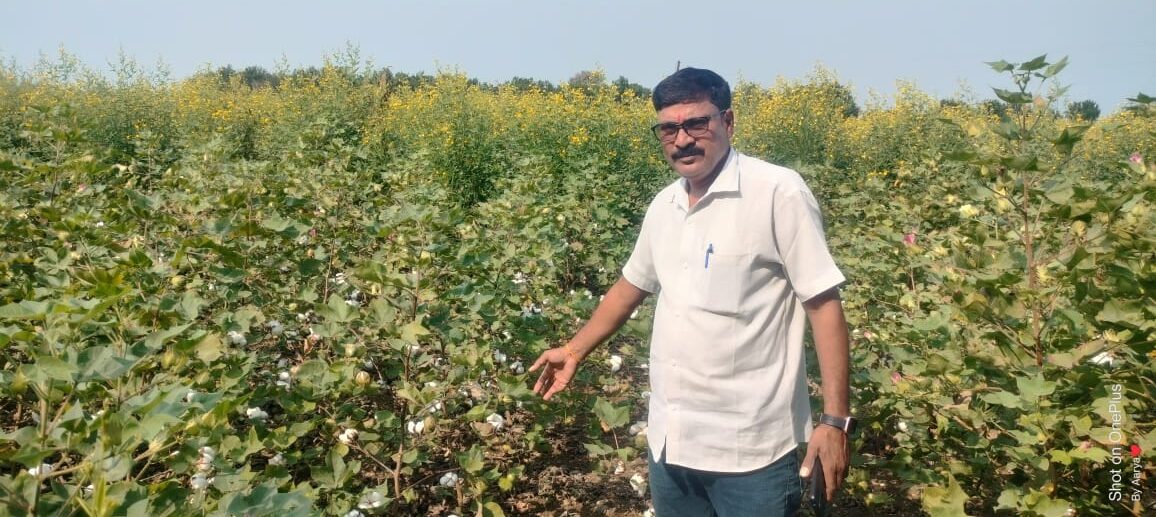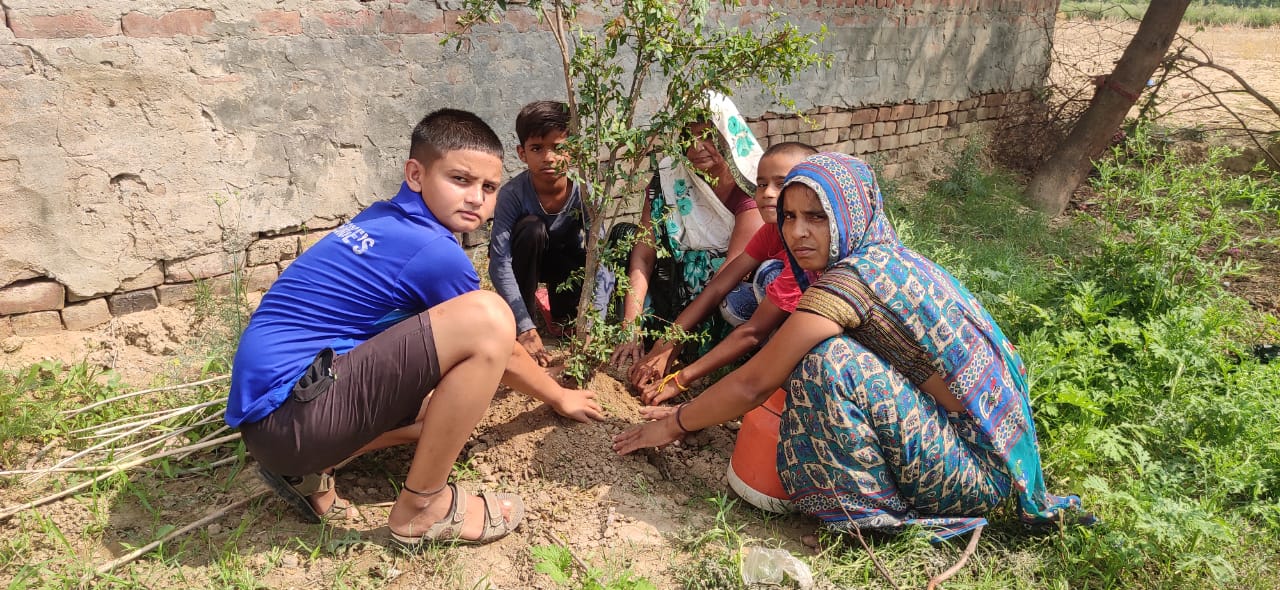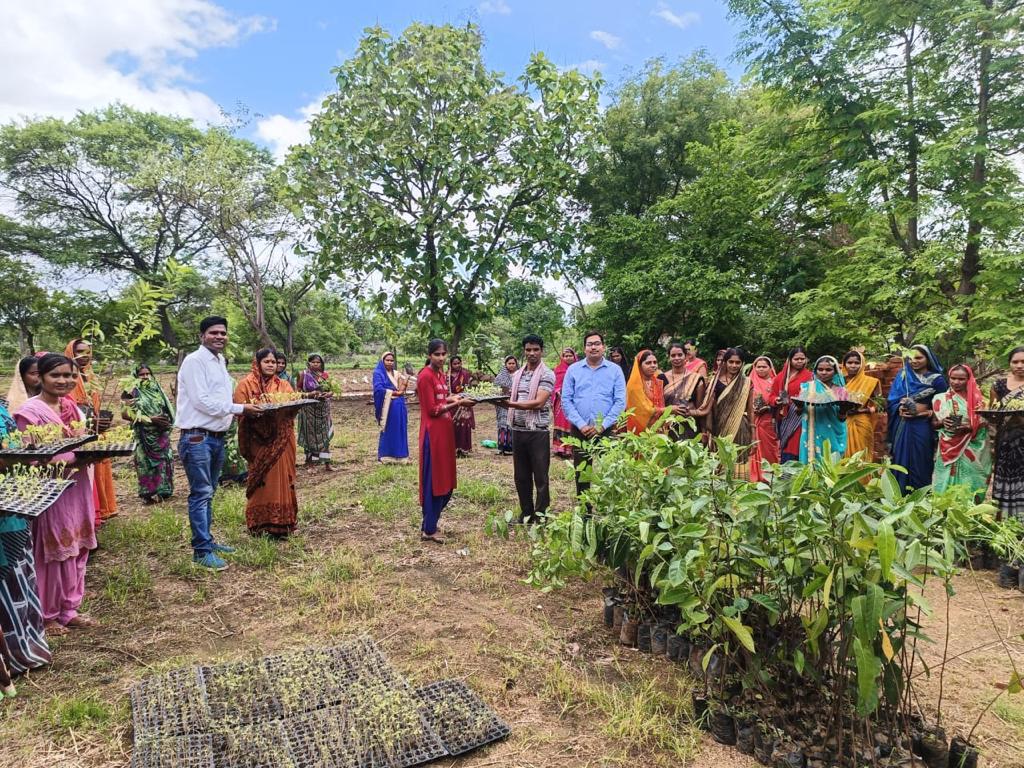Medicinal plants not only heal but also offer sustainable income, as exemplified by Lakhan Pathak and Dinesh Patidar in Solidaridad’s Medicinal and Aromatic Plants program
For years, Lakhan Pathak, a farmer from Pali village in Shamshabad block of Vidisha district, Madhya Pradesh, cultivated soy and wheat in the 12.5 acres of land he owned. His meagre yearly income of ₹5 lakh took a hefty blow with the arrival of the COVID-19 pandemic. He therefore desperately sought an alternative to supplement and increase his earning.
Lakhan took to growing ashwagandha in 2020-2021 on the advice of a Solidaridad expert, Dr Gurpal Singh Jarial. A plant whose root is valued for its varied medical properties, ashwagandha produces a yield of 2 to 2.5 quintal/bigha (roughly 0.25 hectares). After a thorough training in production techniques and practices, he harvested the first batch of ashwagandha crop on a 4-hectare (12.3 acres) land in 2021–2022. And, to his great surprise, against an investment of ₹2.5 lakh, he was able to earn a profit of ₹10 lakh (double of what he had been earning pre-pandemic) — the huge market demand ballooning the plant’s value to ₹40,000 per quintal from the average market price of ₹20,000 per quintal. Lakhan was also able to cut down on transport costs to the mandi because the traders themselves came to take the produce from his field.
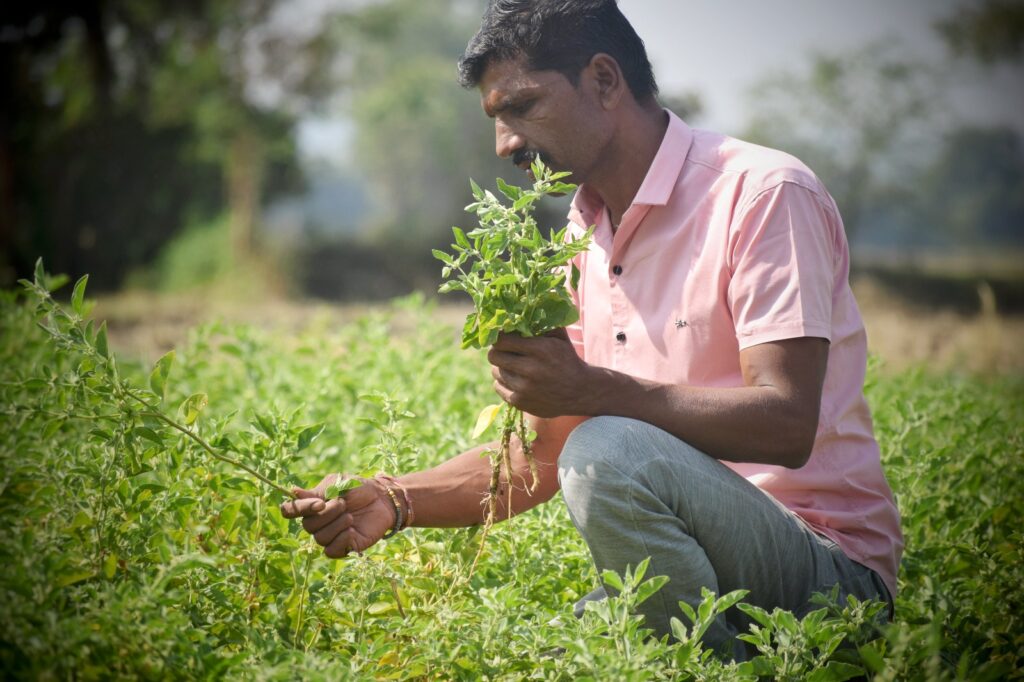
Lakhan has not looked back since — he is now a lead farmer and an entrepreneur dealing in medicinal plants in the region. He has also trained around 100 villagers in Pali and surrounding villages in ashwagandha cultivation. Lakhan and the farmers have also come together under the banner of Bhardwaj Herbs and Ayurveda Private Limited (a company they have registered) to provide a better market for their produce and leverage the economy of scale. The success of his endeavours has motivated Lakhan to also take up turmeric cultivation on 1 hectare of land against an investment of ₹1 lakh.
The suitable climate, the beneficial and immunity-boosting nature of the plants, an assured market sale and a robust market infrastructure have all played a role in Lakhan’s success story. He also credits Dr Jarial for the technical knowledge he has gained in production technology, harvesting and post-harvesting processes — all requisites for earning a profitable market price — and their implementation.
“Shifting to medicinal farming from conventional farming has been a transformative journey for me. It’s not just about financial returns, it also entails contributing to the well-being of the society. I want to thank Solidaridad — their intensive technical support and expert guidance have empowered me to embrace a new path. With their help, we now have a processing unit and have even registered a society ‘Kanan Krishak Utkarsh Kalyan Samiti’. We farmers are on our way to become entrepreneurs,” Lakhan remarks.
RECLAIMING SUSTAINABILITY IN MEDICINAL PLANTS
In Madhya Pradesh, Solidaridad has designed an integrated programme named Sustainable Medicinal and Aromatic Plants to address the multi-faceted sustainability issues faced by the medicinal and herbal medicine sector. The programme introduces medicinal and aromatic plants (MAPs) as additional crops to enhance the livelihood and income of smallholders – and encourages farmers to practice regenerative agriculture. The crops cultivated under the programme include ashwagandha, mint, lemongrass, kalmegh, tulsi, akarkara, black cumin, isabgol and turmeric.
Currently, the programme is being implemented in eight districts of Madhya Pradesh and among 1,000 medicinal and aromatic crop-growers. The programme also facilitates the implementation of the Voluntary Certification Scheme for Medicinal Plant Produce (VCSMPP) launched by the National Medicinal Plants Board (NMPB) in collaboration with the Quality Council of India (QCI). Solidaridad is also collaborating with the state’s AYUSH department in the execution of the Devaranya Yojana (a social welfare scheme that aims to increase employment opportunities in the tribal areas) in these districts.
The programme promotes sustainability in the MAP sector by adopting an integrated, market-based, entrepreneurial approach. It provides interventions at four key levels:
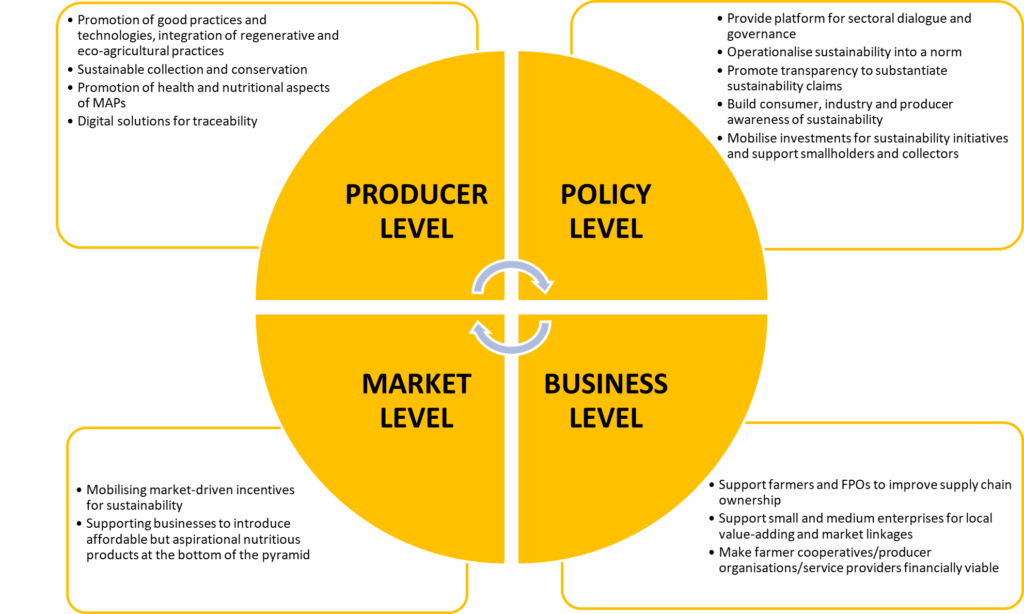
“India is a leading producer and exporter of medicinal herbs. To increase the country’s potential in harnessing the benefits of medicinal herbs, the Sustainable MAPs programme is being executed in Madhya Pradesh. Through this programme, not only have we improved the livelihoods of farmers by providing them with opportunities to earn a sustainable income, we have also witnessed the restoration of degraded lands and the preservation of biodiversity in the regions where we operate. Solidaridad is promoting MAPs as a part of regenerative farming systems,” explains Dr Suresh Motwani, General Manager, Solidaridad.
Overall, the activities of Solidaridad are guided by the following principles:
| INCLUSIVITY | IN BALANCE WITH NATURE | PROSPERITY |
| Affordable healthcare and nutrition | Eco-friendly and climate-smart farming | A sound business case for farmers and diversification of their income |
| Equal opportunity to participate and benefit | Address deforestation, climate change adaptation and mitigation | Job creation and added value through value chain approach |
| Youth entrepreneurship and green jobs creation | Regenerative, resource-efficient, and circular agricultural practices | Boost social and economic impact |
| Enhance women’s leadership | Judicious/no use of chemicals | Rural-urban linkages and shift towards green- and plant-based economies |
A SUSTAINABLE WAY OF LIFE
The cultivation of medicinal plants supports the principles of regenerative agriculture by embracing practices that enhance biodiversity, soil health, and overall ecological resilience. The practice contributes to soil health which is a prime component of regenerative agriculture as there is reduced need of tillage and fertilisers. Also, the roots of medicinal plants left after harvesting boost the nutrient content of soil. The cultivation of MAPs is, therefore socially, economically, and environmentally sustainable.
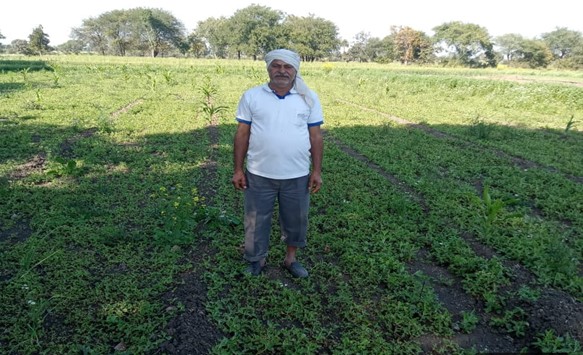
Learning about these benefits, Dinesh Patidar, a farmer from Rola village in Madhya Pradesh’s Sehore district, successfully made the shift from wheat and chickpea cultivation to ashwagandha cultivation. For the past four years, Patidar has been an active participant in Solidaridad’s field training and meetings. In 2022, with Solidaridad’s help and the information acquired on good and sustainable practices, he harvested ashwagandha on one acre of land, earning a profit of ₹1 lakh by selling his produce to the agri-produce market in Neemuch district — an amount much higher than what he would have gained by growing and selling conventional crops. It’s not surprising that today, Dinesh is also growing medicinal plants other than ashwagandha on his farm — namely akshara (ixora) on one acre and kalonji (black cumin) on 0.6 acres of land.
Similar to Lakhan, the beneficial effects of Dinesh’s persistence have been infectious. More than 50 villagers in Rola, inspired by Dinesh’s example, have taken up ashwagandha collection to eke out a sustainable living and way of life. “The programme has ignited a spark of curiosity among the fellow farmers of my village. They now come to me to learn the techniques of cultivating medicinal plants,” says Dinesh. The Solidaridad field experts who are providing technical support and training to the villagers couldn’t be any prouder of the way things have turned out.


